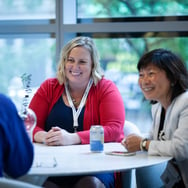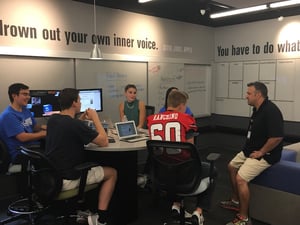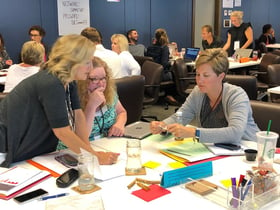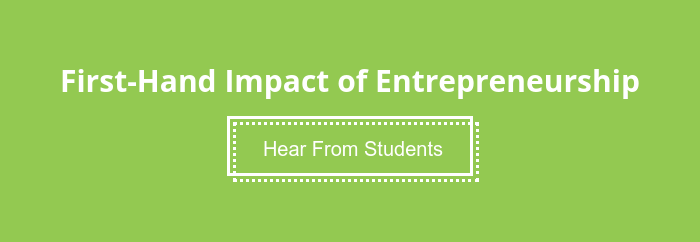 In 1976, computer scientist Grace Murray Hopper said, “The most dangerous phrase is: We’ve always done it that way.” And she was right. In education, change happens fast. Technology advancements, shifts in the economy, and growing student needs require more from educators. Instead of approaching learning the way they always have, today’s teachers have an opportunity to transform the modern classroom by relinquishing a little control in favor of a little ambiguity. After all, a teacher’s job isn’t about being a content expert. It’s about supporting and facilitating student learning, no matter what it looks like.
In 1976, computer scientist Grace Murray Hopper said, “The most dangerous phrase is: We’ve always done it that way.” And she was right. In education, change happens fast. Technology advancements, shifts in the economy, and growing student needs require more from educators. Instead of approaching learning the way they always have, today’s teachers have an opportunity to transform the modern classroom by relinquishing a little control in favor of a little ambiguity. After all, a teacher’s job isn’t about being a content expert. It’s about supporting and facilitating student learning, no matter what it looks like.
At Uncharted Learning, we don’t do things the way they’ve always been done. Below, explore our curriculum roadmap to learn more about our approach to curriculum development and how Uncharted Learning's youth entrepreneurship programs meet changing parent, teacher, and student priorities to reflect current industry thinking.
Uncharted Learning Curriculum Roadmap
Our youth entrepreneurship curriculum puts students at the center of their own learning, and that requires teachers to let go of always having the “right” answer. In entrepreneurship classes like INCubatoredu, there isn’t just one right answer. Instead of acting as an instructor or lecturer, entrepreneurship teachers act as guides to help students find their own solutions. Here’s how we design our curriculum to support teachers in embracing these new ways of engaging and empowering students:
Backward Curriculum Design
At Uncharted Learning, we design our curriculum in reverse. Backward design is the process of starting at the “finish line” and working backward to design a curriculum that ensures all students successfully complete the course and learn what the teacher intended for them to learn. This approach to curriculum development helps engineer learning experiences so that activities and assessments can be selected more intentionally and more closely align with course outcomes. A few benefits of backward curriculum design include:
This approach to curriculum development helps engineer learning experiences so that activities and assessments can be selected more intentionally and more closely align with course outcomes. A few benefits of backward curriculum design include:
- Clear learning objectives for each unit of study and for the course as a whole
- Activities that logically align with desired course outcomes
- Assessments that give students a chance to demonstrate learning outcomes in the form of knowledge and skill development
Our Student Programs
We believe entrepreneurship is a focus that goes beyond a curriculum. We strategically and thoughtfully design each course curriculum as a team, aiming to blend foundational business topics with real-world learning, team teaching between teachers and mentors, and ongoing professional development training for classroom teachers and volunteers.
Our programs are evergreen, dynamic, and constantly evolving in an effort to align with changing best practices and industry and employer standards. Instead of waiting for our curriculum to become out-of-date and then revising it, we proactively examine what is and isn’t working in the classroom, and fine-tune our approach in real-time. We partner with industry experts to gain insight about what’s happening in the business world, and then implement ideas, revisions, and other fixes to our curriculum accordingly.
Developing Youth Entrepreneurship Curriculum - Our Process
At Uncharted Learning, we empathize with schools stuck in complex curriculum development cycles — because we’ve been there, too. Our team is comprised of educators and entrepreneurs who apply what they know about backward design to each course curriculum the same way teachers apply their knowledge to daily lesson plans.
 We stay current on educational trends and best practices by listening to our vibrant community of teachers, connecting with educational thought leaders, and actively engaging in national education networks. We strive to blend our education and business backgrounds to design challenging, relevant, experiential, 21st-Century learning to each of our programs.
We stay current on educational trends and best practices by listening to our vibrant community of teachers, connecting with educational thought leaders, and actively engaging in national education networks. We strive to blend our education and business backgrounds to design challenging, relevant, experiential, 21st-Century learning to each of our programs.
A few key pieces of our curriculum development process include:
- Tracking and implementing teacher requests in real time
- Managing a roadmap of annual program enhancements
- Enlisting industry experts to review and guide curricular changes
Our People
Our network is made up of hundreds of teachers and volunteer coaches and mentors. Across the country, they help us shape our ever-evolving curriculum. We also have a dedicated Professional Advisory Network of industry experts who give us feedback about our curricular enhancements, and the overall direction of the Uncharted Learning programs. The council includes master INCubatoredu and MobileMakersedu teachers, a successful entrepreneur, a university business faculty member, and a professional app developer.
Charting New Heights in Curriculum Development
Just like in business, best practices in education are always changing. Not long ago, lean startup methodology emerged to replace old-school business planning. In education, personalized, experiential, project-based, student-centered learning presents an alternative to outdated, content-driven, standardized, stand-and-deliver ways of teaching.
Modern education demands programs and curriculum that evolve alongside student needs, best practices, and industry standards. That means they must regularly be refreshed to ensure relevance in a rapidly changing workplace.
Navigating student needs, curriculum updates, budget cuts, and competing priorities requires knowledge of education’s unique challenges and complexities — and a team of teachers and administrators willing to prioritize the needs of students above all else.
Ready to start transforming your course curriculum and embrace entrepreneurship as a strategy for launching students straight from the classroom into future-ready leadership roles in their lives and careers? We’ve got your back! Whether you already know your curriculum needs an overhaul and have your eye on youth entrepreneurship, or you’re brand new to curricular transformation and curious how entrepreneurship might fit, keep the wheels turning by asking yourself these questions:
- What kind of graduates do you want to send out into the world? Is your current curriculum succeeding at shaping and preparing students in the ways you imagine?
- What opportunities do your students have to take charge of their own learning? What would a curriculum centered around student agency look like? How might students exercise voice and choice more in their learning?
- Are your students future-ready? How could your curriculum better prepare students for the 21st century skills in high demand by colleges and employers?
- How does your district prioritize options for curricular transformation? How would you re-think the priorities if you could start from scratch?

